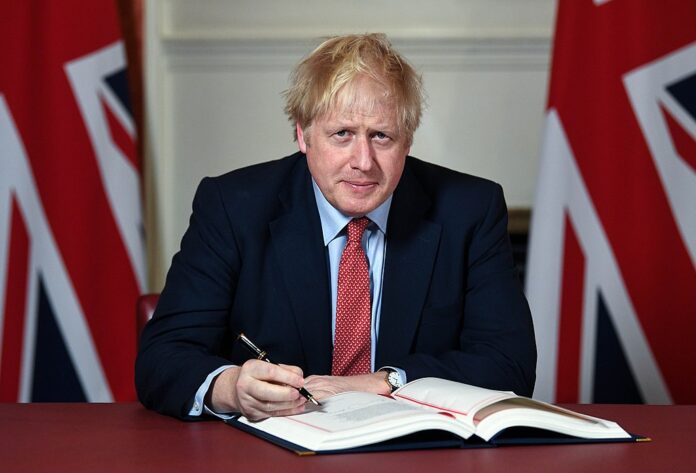Former Prime Minister Boris Johnson urges voters to reject labour’s potential ‘sledgehammer majority,’ emphasizing the risks of a far-left government under Keir Starmer
In an unexpected appearance at a Conservative Party rally on Tuesday night, former Prime Minister Boris Johnson warned against a Labour “sledgehammer majority,” cautioning that it could deliver “the most Left-wing government since the war.” Addressing the crowd at the National Army Museum in London, Johnson urged Conservatives to unite and prevent Labour from winning a sweeping victory.
Johnson’s plea came as recent polls indicated Labour, led by Sir Keir Starmer, was on track for a vast majority in the Commons. “Too many good, kind moderate Tories are about to vote for other parties, which would mean they get exactly the opposite of what they really want,” Johnson said, stressing the importance of rallying behind the Conservative Party to avert what he described as a looming disaster.
The former Prime Minister, who had kept a low profile during the campaign until now, decided to step in following a text exchange with current Prime Minister Rishi Sunak. In his speech, Johnson buried past grievances, including blaming Sunak for his downfall in 2022, to emphasize party unity. He introduced Sunak on stage with a passionate call to action: “We cannot just sit back as a Labour government prepares to use a sledgehammer majority to destroy so much of what we achieved.”
Johnson’s warnings were dire. He predicted that a Labour government would reintroduce free movement, comply with EU laws, and scrap the controversial Rwanda immigration scheme. He also accused Starmer of being a “disciple” of former Labour leader Jeremy Corbyn and claimed that Labour would transform the UK into the “punk of Brussels.”
The rally took place on the eve of the final day of campaigning, with Sunak set to make a last-ditch appeal to swing voters, warning them of potential tax increases on homes, pensions, and cars under Labour. Sunak echoed Johnson’s sentiments, thanking him for his support and stressing the need for Conservative unity. “Just think, it was just the other day when Keir Starmer was saying that Jeremy Corbyn would have been a better Prime Minister than Boris. That is shameful!” Sunak exclaimed.
Suella Braverman, the Home Secretary, also made headlines by declaring the election battle “over” and calling for the Conservative Party to rediscover its “soul” and shift back to the right. She criticized the party’s recent centrism and warned that failing to change course would give Starmer a clear path to power.
Despite the heightened rhetoric, recent polls show a mixed picture. While the Tories have narrowed the gap with Labour to 19 points, they are still predicted to win just 64 seats. A Redfield and Wilton poll showed a slight drop in support for Reform UK, but Labour remains on course for a comfortable majority.
Johnson’s last-minute intervention aimed to rally Conservative supporters and deter votes for smaller parties like Reform UK. He warned against “Putinistas” within these parties, accusing them of excusing Russia’s 2022 invasion of Ukraine. “They can achieve nothing in this election except to usher in the most Left-wing Labour government since the war,” he said.
Mel Stride, the Work and Pensions Secretary, also weighed in, predicting that a Labour government would repeat the economic mistakes of the Blair era, leading to increased benefits spending and fiscal mismanagement.
Analysis
Political: Boris Johnson’s surprise rally appearance underscores the high stakes of the upcoming election. By emphasizing the threat of a Labour super-majority, Johnson seeks to consolidate Conservative support and mitigate the risk of vote-splitting among right-leaning voters. His appeal to party unity and focus on potential policy reversals under Labour highlight the strategic political manoeuvres aimed at preserving Conservative influence. This move also reflects internal party dynamics, where prominent figures like Johnson and Braverman are positioning themselves for potential future leadership roles, contingent on the election outcome.
Social: Johnson’s speech taps into fears about a shift in national identity and policy direction under a Labour government. His references to “mandatory workers” and the loss of sovereignty resonate with segments of the population concerned about cultural and political changes. The rallying cry to prevent Labour’s perceived overreach appeals to traditional Conservative values, seeking to mobilize voters who prioritize nationalistic and conservative social policies. This social dynamic is crucial in an election that is as much about cultural identity as it is about economic and political policies.
Racial: Johnson’s rhetoric around immigration and sovereignty highlights the racial and nationalistic undertones in the election discourse. His criticism of Labour’s stance on free movement and EU alignment suggests a return to debates reminiscent of the Brexit era. The focus on the Rwanda scheme and controlled immigration speaks to voters concerned about border control and national security. However, this approach risks alienating minority communities and those who view such policies as xenophobic or exclusionary. The racial implications of Johnson’s warnings are significant in shaping voter attitudes and party alignments.
Gender: Johnson’s speech remains a critical undercurrent. The Conservative Party’s emphasis on traditional values and resistance to progressive social policies may appeal to voters who feel left behind by rapid social changes. However, this stance also risks alienating women and younger voters who prioritize gender equality and progressive policies. The involvement of prominent female figures like Suella Braverman in the campaign highlights the party’s attempt to balance these dynamics and appeal to a broader electorate.
Economical: Johnson’s speech paints a stark picture of the consequences of a Labour government, predicting increased taxes and fiscal irresponsibility. This framing aims to appeal to voters concerned about economic stability and personal financial security. By invoking the spectre of past Labour governments, Johnson seeks to remind voters of the perceived economic mismanagement associated with left-wing policies. This economic argument is central to the Conservative campaign, positioning the party as the guardian of fiscal prudence and economic growth.
